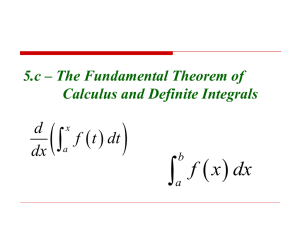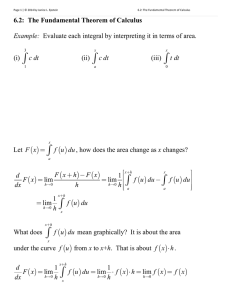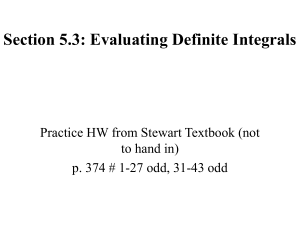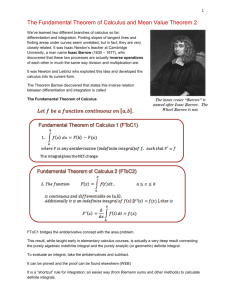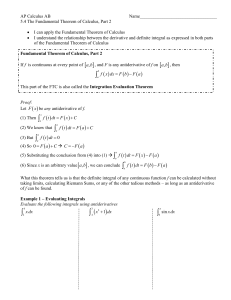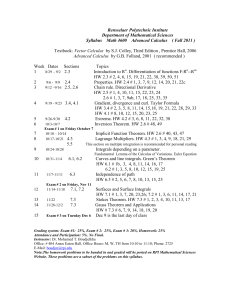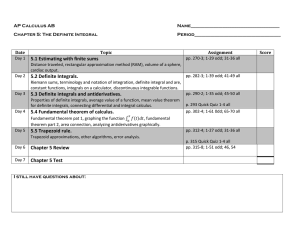Document 10413667
advertisement
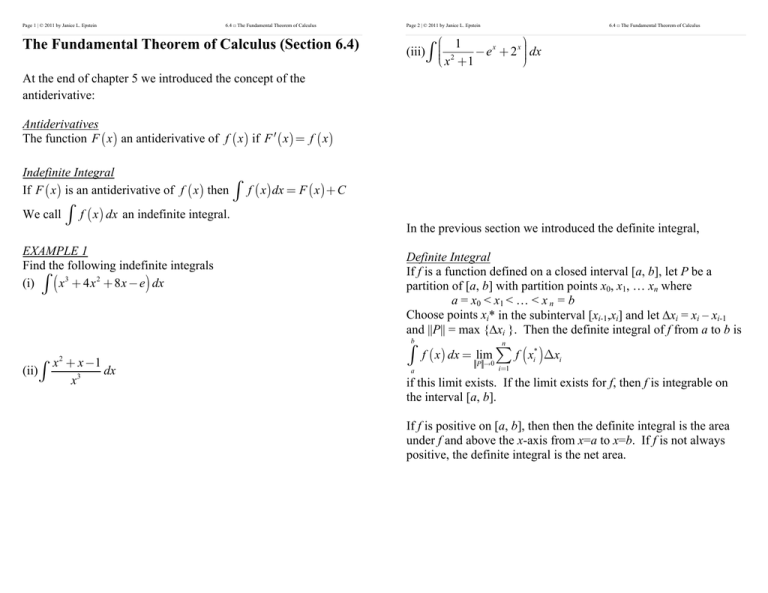
Page 1 | © 2011 by Janice L. Epstein
6.4 □ The Fundamental Theorem of Calculus
The Fundamental Theorem of Calculus (Section 6.4)
Page 2 | © 2011 by Janice L. Epstein
6.4 □ The Fundamental Theorem of Calculus
æ 1
ö
- e x + 2 x ÷÷÷ dx
(iii) ò çç 2
çè x + 1
ø
At the end of chapter 5 we introduced the concept of the
antiderivative:
Antiderivatives
The function F ( x ) an antiderivative of f ( x ) if F ¢ ( x ) = f ( x )
Indefinite Integral
If F ( x ) is an antiderivative of f ( x ) then
We call
ò
f ( x ) dx an indefinite integral.
EXAMPLE 1
Find the following indefinite integrals
(i) ò ( x 3 + 4 x 2 + 8 x - e) dx
ò
f ( x ) dx = F ( x ) + C
In the previous section we introduced the definite integral,
Definite Integral
If f is a function defined on a closed interval [a, b], let P be a
partition of [a, b] with partition points x0, x1, … xn where
a = x0 < x1 < … < x n = b
Choose points xi* in the subinterval [xi-1,xi] and let ∆xi = xi – xi-1
and ||P|| = max {∆xi }. Then the definite integral of f from a to b is
b
(ii) ò
x 2 + x -1
dx
x3
ò
a
n
f ( x ) dx = lim å f ( xi* )Dxi
P 0
i=1
if this limit exists. If the limit exists for f, then f is integrable on
the interval [a, b].
If f is positive on [a, b], then then the definite integral is the area
under f and above the x-axis from x=a to x=b. If f is not always
positive, the definite integral is the net area.
Page 3 | © 2011 by Janice L. Epstein
6.4 □ The Fundamental Theorem of Calculus
EXAMPLE 2
Evaluate each integral by interpreting it in terms of area.
3
(i)
ò c dt
1
Page 4 | © 2011 by Janice L. Epstein
6.4 □ The Fundamental Theorem of Calculus
THE FUNDAMENTAL THEOREM OF CALCULUS, PART 1
If f is continuous on [ a, b ], then the function g defined by
x
g ( x ) = ò f (t ) dt
a£ x£b
a
is continuous on [ a, b ], differentiable on (a, b) and g ¢( x ) = f ( x )
EXAMPLE 3
Find the derivative of the given functions
x
(ii)
ò
c dt
a
x
(i) g ( x ) = ò t 3 + 1 dt
-1
x
(ii) g ( x ) = ò
1
t2
dt
t 2 +1
x
(iii)
ò t dt
0
p
(iii) g ( x ) = ò
x2
sin t
dt
t
Page 5 | © 2011 by Janice L. Epstein
6.4 □ The Fundamental Theorem of Calculus
THE FUNDAMENTAL THEOREM OF CALCULUS, PART 2
If f is continuous on [ a, b ], then
6.4 □ The Fundamental Theorem of Calculus
p/2
(iii)
ò (cos q + 2sin q ) d q
0
b
ò
Page 6 | © 2011 by Janice L. Epstein
f ( x ) dx = F (b) - F (a ) = F ( x) a
b
a
where F is any antiderivative of f.
EXAMPLE 4
Evaluate the following definite integrals
2
(i)
ò (w
3
-1) dw
2
0
0
(ii)
ò
-2
2
x -1 dx
EXAMPLE 5
The velocity function (in meters per second) is given for a particle
moving along a line. Find the displacement and distance traveled
by the particle during the given time interval.
v (t ) = t 2 - 2t - 8, 1 £ t £ 6

